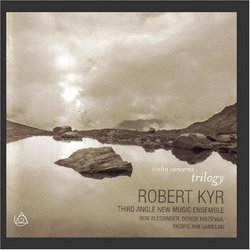Love! Harmony! Transcendence!
Giordano Bruno | Wherever I am, I am. | 09/16/2008
(5 out of 5 stars)
"NOT all modern music is dark and despairing, though some is! NOT all modern music is impenetrable to untrained listeners!
Robert Kyr is as committed a modernist as any composer on the scene, but his music is remarkably accessible and enjoyable on first hearing. He isn't, to my ears, on what another reviewer has called a "spiritual" journey in music. He's not another Arvo Part, though like Part he has drawn inspiration from 'early music' and often collaborates with 'early music' ensembles. Kyr is above all a Humanist, emotionally committed to the transcendence of cultural boundaries - acoustical boundaries, in the application - and the 'harmonization' of humanity in a world of peace.
This Trilogy of violin concertos might well have been called a Triptych, analogous to a medieval painting of the three states of history. The first concerto - On the Nature of Love - is constructed on variations of the hymn tune 'What Wond'rous Love is This' and thus on archaic-sounding chords of fourths and fifths, Kyr declares in his notes that "the focus is on human love and the variations are grouped into four arcs of music that correspond to four phases of a relationship." Not about divine Love, in short, despite the text of its hymnal theme! The fourth arc, in Kyr's notes,is identified as "Celebrating" and, believe me, the music is celebratory! Exuberant! A joy to listen to! This concerto is composed well within the stylistic expectations of audiences that enjoy 19th Century classical performances.
The second concerto - On the Nature of Harmony - is composed for what Kyr calls a "world orchestra," a combination of Euro-American instruments and an Indonesian gamelan ensemble. Quite literally, this is a study of the nature of harmony in its musical meaning, since the two groups of instruments operate on seemingly incompatible systems of tuning. There's a deep and challenging intellectualism at the core of such a work, but to the listeners' ears it's a shimmering soundscape, a work of colorful up-tempo beauty, another joy to listen to, radically more modernist than the first concerto and yet seeming to sustain its development with thematic and structural continuity.
The third concerto - On the Nature of Peace - flows emotionally and harmonically from the momentum of the first and second. It's by far the most rigorously modernist, releasing a torrent of sound not bounded by tonality or traditional rhythmic patterns. In the first movement, for instance, the solo violin, the percussionists, and the orchestra are 'uncoupled' in tempo, resulting in an 'aleatoric' music - a music in which chance relationships of sound occur. In a sense, Kyr has recapitulated the history of European music in his triptych, from harmonized monophony to polyphony to aleatory. No question, this third concerto is the most dramatic and at times chaotic soundscape of the Trilogy, but coming as it does out of the easier previous soundscapes, it WILL make musical sense to most listeners. And it will have emotional impact.
These are violin concertos - pieces demanding virtuosic solo musicianship in the orchestral context. They are inherently display pieces for violinist Ron Blessinger, who performs them blessedly well. The violin is above all the unifier of the three distinct musical structures, not only because it sings the same language of running and jumping figures of impassioned melody throughout, but also because it seems to play the role of detached observer. Blessinger's fiddle is a restless traveler through the three 'natures' of human transcendence.
Trust your ears! Think this way: "Ah! Modern music! My music, which sings to me! I like it!""
Lyrical complexity, spiritual adventures
Dr. Debra Jan Bibel | Oakland, CA USA | 04/22/2007
(5 out of 5 stars)
"These three delightfully lyrical concerti, with themes respectively of love, harmony, and peace, are all distinct. The middle work is similar to the art of the late composer Lou Harrison, and indeed the canonic and the dance variations of Concerto No. 2 employ a gamelan ensemble as many of Harrison's works. However, Kyr is even more a romantic, and his sweet spiritual music soars and envelops the listener. Ron Blessinger's violin performance is a perfect match for these compositions. The first work on love is indeed amorous, but the third, regarding peace, is not so peaceful at first. It is the not the peace of spiritual or transcendent tranquility but one of aftermath. It must be hard fought to achieve, metaphorically. Drumming, clanging, and clamor give way to lamentation and reconciliation; it ends in resolve, solace, and, yes at last, peace. Robert Kyr, who is at home also in Early Music, is an excellent composer and I look forward to hearing more of his explorations. This particular recording will surprise you in how good it is."
Amazingly beautiful
frank lindemann | 09/09/2006
(5 out of 5 stars)
"I noticed Violin Concerto Trilogy hadn't been reviewed and it deserves to be. Kyr's music is intelligent, listenable and lovely. This and 'Unseen Rain' both deserve a much wider audience. I recommend both."

